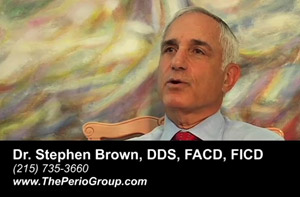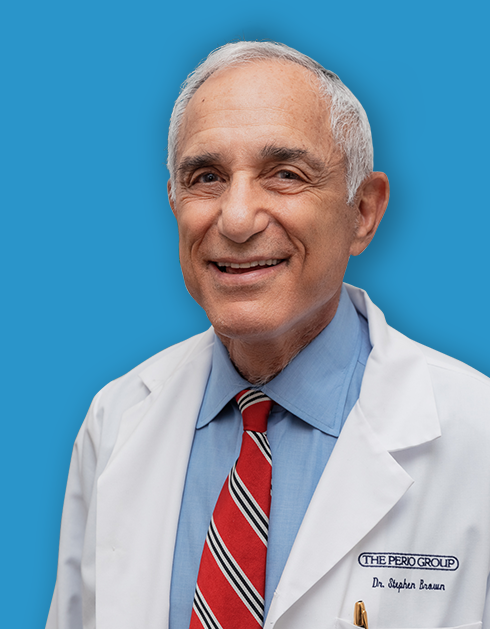Everyone on the planet will have experienced bad breath (or “halitosis” to give it its official medical name) at some point in their lives. Sometimes having bad breath isn’t avoidable, particularly if you’ve just eaten something with very strong ingredients like garlic or onions.
Another example of where bad breath is unavoidable is when you first wake up in the morning and have what is known as “morning breath” due to reduced saliva flow from the night before. Saliva can be thought of as your body’s natural mouthwash as it helps to wash away food remnants and bacteria in your mouth.
Trust Your Oral Health to Top Periodontist,
Dr. Stephen Brown.
A dentist who teaches other dentists
In the majority of cases, the above two examples are quite normal and nothing that should cause any concern. But, what if you’re finding that you have bad breath more often than not each day? In those situations, persistent bad breath can be an indicator that you may have dental or medical problems that need addressing.
You are likely reading this page because you feel that you’ve got bad breath and it’s causing problems with your lifestyle. Keep reading to learn more about halitosis and what your options are for bad breath treatment.
What if I’m being paranoid about my bad breath?
As mentioned at the beginning of this page, everyone experiences bad breath at some point in their lives. If you feel that you may have halitosis, you shouldn’t feel “paranoid” about broaching the subject.
In fact, it’s a good thing that you are bringing up the subject because if you did have halitosis due to a dental or medical condition, it’s something that can be addressed. Thankfully, it’s easier than you think to get treatment for bad breath. To get your bad breath treatment, it makes sense to visit a fully qualified and experienced periodontist in order to get a full diagnosis.
What can cause halitosis?
Assuming that you’re experiencing bad breath from causes excluding morning breath and after eating a flavorful meal, you could be wondering what could cause halitosis. Here is a brief list that describes the most typical causes of bad breath in men and women of all ages:
- Poor dental hygiene. It comes as no surprise that bad breath can happen if you seldom brush or floss your teeth;
- Gum disease. Officially known as periodontal disease, it’s essentially an inflammation of the tissue that surrounds your teeth;
- Dry mouth. Xerostomia, to give it its official medical name, typically occurs as a side effect of medication used to treat conditions like depression, pain, allergies, hypertension, and obesity;
- Respiratory tract infections. If a person has got an ongoing respiratory tract infection in their throat, lungs, or even their sinuses, it could be the cause of halitosis;
- Ongoing illnesses. Examples include diabetes, lung disease, and kidney disease;
- Acid reflux. Halitosis is almost always prevalent when someone regularly experiences acid reflux after consuming some food;
- Smoking. Cigarettes, cigars, and chewing tobacco tend to dry out the mouth. Because there’s little saliva to transport food particles and bacteria away from the mouth, halitosis will inevitably occur.
Why isn’t mouthwash curing my halitosis?
If you’ve been suffering from regular bad breath, you may have used mouthwash with some degree of success. But, why isn’t mouthwash curing your halitosis? It’s meant to be a form of bad breath treatment, right? Unfortunately, mouthwash will only mask the odors from your mouth for a few hours at best.
It doesn’t matter that you’ve been brushing your teeth religiously each day, flossing, and using mouthwash. If you’re still suffering from halitosis and you feel that the problem isn’t down to certain foods and drinks that you consume each day, it makes sense to get treated for the cause of the problem. That means seeing a qualified and highly experienced periodontist.
How can I get treatment for my bad breath?
So far you know about the possible causes of halitosis, and the scenarios where bad breath may not signify something is wrong. If you feel that you need to get dental treatment for your halitosis, your first call should be to a periodontist.
If you’re in Philadelphia, Pennsylvania, one of the leading periodontists in the city is Dr. I. Stephen Brown from The Perio Group. To schedule an appointment with Dr. Brown, please contact his team at (215) 735-3660. Alternatively, you can request an appointment by filling in the Request an Appointment form via the Contact Us page.
Why should I consider Dr. Brown from The Perio Group?
While there are many periodontists in Philadelphia and throughout Pennsylvania, Dr. Brown is well-known for being one of the best periodontists in the city and even throughout the state.
Dr. Brown is also one of the country’s most distinguished practitioners in the fields of periodontics and dental implants. He’s a staunch proponent of effective, less-painful options when it comes to dental treatment and is a pioneer in his own right. That’s because he was the first dentist in the state to offer patients Laser-Assisted New Attachment Procedure (LANAP), a minimally-invasive treatment for gum disease.
When you first visit Dr. Brown, you’ll soon realize that you’re in the company of dental experts and people that truly care about your dental health. Dr. Brown and his team will ensure that you are feeling comfortable in their care and fully explain the causes of your dental issues and offer solutions that will lead to complete bad breath treatment.
If you’d like to discuss your halitosis with Dr. Brown, please schedule an appointment today by calling (215) 735-3660 or filling out and submitting our Request an Appointment form.
Top tips to take care of your teeth
While Dr. Brown and his team can help to cure you of your halitosis, it’s vital that you carry on taking care of your teeth at home. Here are some of his top tips for dental care and oral hygiene:
- Brush your teeth, gums, and tongue twice a day, and floss once a day;
- Drink plenty of water to ensure constant saliva production in your mouth;
- Avoid sugary foods and drinks.


